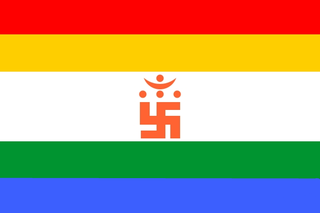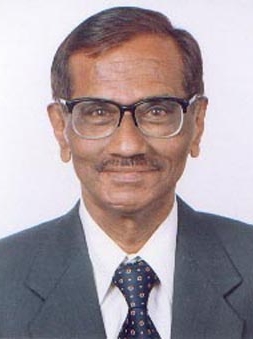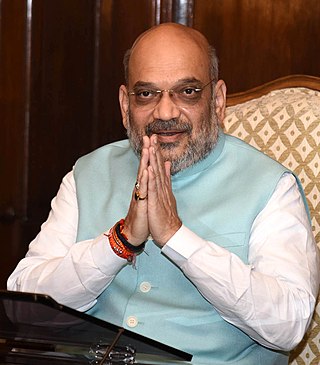
Hindus are people who religiously adhere to Hinduism. Historically, the term has also been used as a geographical, cultural, and later religious identifier for people living in the Indian subcontinent.

Indian religions, sometimes also termed Dharmic religions or Indic religions, are the religions that originated in the Indian subcontinent. These religions, which include Hinduism, Jainism, Buddhism, and Sikhism, are also classified as Eastern religions. Although Indian religions are connected through the history of India, they constitute a wide range of religious communities, and are not confined to the Indian subcontinent.
Religious conversion is the adoption of a set of beliefs identified with one particular religious denomination to the exclusion of others. Thus "religious conversion" would describe the abandoning of adherence to one denomination and affiliating with another. This might be from one to another denomination within the same religion, for example, from Protestant Christianity to Roman Catholicism or from Sunnī Islam to Shīʿa Islam. In some cases, religious conversion "marks a transformation of religious identity and is symbolized by special rituals".
Hindutva is a political ideology encompassing the cultural justification of Hindu nationalism. The political ideology was formulated by Vinayak Damodar Savarkar in 1922. It is used by the Rashtriya Swayamsevak Sangh (RSS), the Vishva Hindu Parishad (VHP), the Bharatiya Janata Party (BJP) and other organisations, collectively called the Sangh Parivar.
Freedom of religion in India is a fundamental right guaranteed by Article 25-28 of the Constitution of India. Modern India came into existence in 1947 and the Indian constitution's preamble was amended in 1976 to state that India is a secular state. Supreme Court of India ruled that India was already a secular state from the time it adopted its constitution, what actually was done through this amendment is to state explicitly what was earlier contained implicitly under article 25 to 28. Every citizen of India has a right to practice and promote their religion peacefully. However, there have been numerous incidents of religious intolerance that resulted in riots and violence, notably, the 1984 Anti-Sikh Massacre in Delhi, 1990 Exodus of Kashmiri Hindus from Kashmir, the 2008 Anti-Christian riots in Odisha. Some perpetrators of the 1984 Anti-Sikh Massacre in Delhi have not been brought to justice despite widespread condemnation.
India since its independence in 1947 has been a secular state. The secular values were enshrined in the constitution of India. India's first prime minister Jawaharlal Nehru is credited with the formation of secular values in the modern history of the country.

The official religion of Pakistan is Islam, as enshrined by Article 2 of the Constitution, and is practised by approximately 96.47% of the country's population. The remaining 3.53% practice Hinduism, Christianity, Ahmadiyya Islam, Sikhism and other religions.

Religion in Nepal encompasses a wide diversity of groups and beliefs. Nepal is a secular nation, and secularism in Nepal under the interim constitution is defined as "religious and cultural freedom, along with the protection of religion and culture handed down from time immemorial." That is, "the state government is bound for protecting and fostering Hindu religion" while maintaining "religious" and "cultural" freedom throughout the nation as fundamental rights.

Jainism is India's sixth-largest religion and is practiced throughout India. Per the 2011 census, there are 4,451,753 Jains in the 1.35 billion population of India, the majority living in Maharashtra, Rajasthan, Gujarat and Madhya Pradesh, Karnataka, however, the influence of Jainism has been far greater on the Indian population than these numbers suggest. Jains can be found in every states and union territories, varying from large societies to smaller. The state of Jharkhand, with a population of 16,301 Jains also contains the holy pilgrimage centre of Sammed Shikharji. Jains can be found throughout India and in many other countries throughout the world.
Jainism is considered to be a legally distinct religion in India. A section of scholars earlier considered it as a Hindu sect or a Buddhist heresy, but it is one of the three ancient Indian religions. On 27 January 2014, the Government of India explicitly awarded the status of a "minority religion" to the Jain community in India, as per Section 2(c) of the National Commission for Minorities (NCM) Act (NCM), 1992.
Rikhabdeo ( Rishabhadeo) is a town in Udaipur district in the state of Rajasthan, in north-west India.

Religion in India is characterised by a diversity of religious beliefs and practices. Throughout India's history, religion has been an important part of the country's culture and the Indian subcontinent is the birthplace of four of the world's major religions, namely, Hinduism, Buddhism, Jainism, and Sikhism, which are collectively known as native Indian Religions or Dharmic Religions.
Jainism is an ancient Indian religion belonging to the śramaṇa tradition. It prescribes ahimsa (non-violence) towards all living beings to the greatest possible extent. The three main teachings of Jainism are ahimsa, anekantavada (non-absolutism), aparigraha (non-possessiveness). Followers of Jainism take five main vows: ahimsa, satya, asteya, brahmacharya (chastity), and aparigraha. Monks follow them completely whereas śrāvakas (householders) observe them partially. Self-discipline and asceticism are thus major focuses of Jainism.

The Vishva Hindu Parishad (VHP) is an Indian right-wing Hindu organisation based on Hindu nationalism. The VHP was founded in 1964 by M. S. Golwalkar and S. S. Apte in collaboration with Swami Chinmayananda. Its stated objective is "to organise, consolidate the Hindu society and to serve and protect the Hindu Dharma". It was established to construct and renovate Hindu temples, and deal with matters of cow slaughter and religious conversion. The VHP is a member of the Sangh Parivar group, the family of Hindu nationalist organisations led by the RSS.

Bal Patil was a Jain scholar, journalist, social activist and Jain minority status advocate from Mumbai, Maharashtra. He was appointed as a member of State Minority Commission by the Govt. of Maharashtra from 2001 to 2004. He was the Secretary-General of All India Jain Minority Forum, New Delhi—a position he held until his death—and was an ardent advocate of minority status for Jainism. The Jain minority cause gained prominence when he petitioned the Supreme Court of India for the recognition of Jain religious minority status on par with other Indian minorities as per the two recommendations by the National Minorities Commission. He was also the first non-medical President of the National Society for the Prevention of Heart Disease & Rehabilitation, Mumbai. He has also authored many books on Jainism and presented several papers at various seminars and conferences.

Amit Anil Chandra Shah is an Indian politician who is currently serving as the 31st Minister of Home Affairs since 2019 and the 1st Minister of Co-operation of India since 2021. He served as the 10th President of the Bharatiya Janata Party (BJP) from 2014 to 2020. He has also served as chairman of the National Democratic Alliance (NDA) since 2014. He was elected to the lower house of Parliament, Lok Sabha, in the 2019 Indian general elections from Gandhinagar. Earlier, he had been elected as a member of the upper house of Parliament, Rajya Sabha, from Gujarat from 2017 to 2019.
Jainism has been engaged in debates with the other philosophical and religious traditions, in which its theories and its followers' practices have been questioned and challenged.
Panchasara Parshwanath temple is a Jain temple located in Patan, Gujarat. The temple was constructed in 8th century during the reign of Vanaraja Chavda of Chavda dynasty.
Anti-conversion laws, or anti-conversion legislations, are a set of judicial rules that restrict or prohibit conversion of faith (proselytism) from one religion to another. It is a federal law in countries such as Algeria, Bhutan, Myanmar, and Nepal. They are meant to prevent forced conversion of individuals to different religions, and offences are punishable by imprisonment and fine. In India, there is no federal law but nine states have sanctioned their own laws, such as Chhattisgarh, Gujarat, Haryana, Himachal Pradesh, Jharkhand, Karnataka, Madhya Pradesh, Odisha, Uttarakhand and Uttar Pradesh. Sri Lanka has prepared its legislation, but has not yet enacted it. Pakistan had introduced the Prohibition of Forced Conversion Bill 2021 that was rejected by its Ministry of Religious Affairs in 2021.









